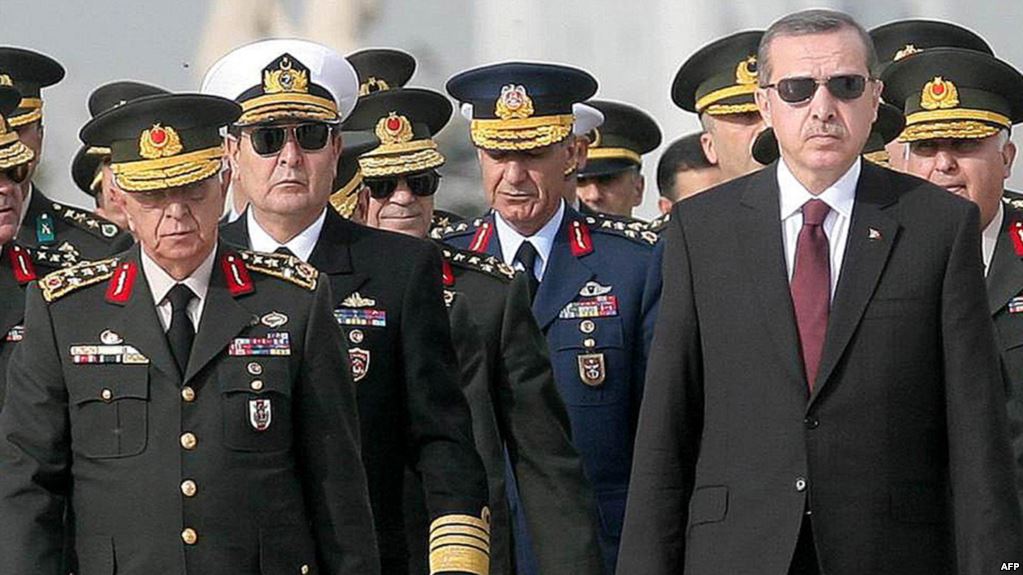Inauspicious Incident: Erdoğan’s Evolving Relationship with Turkey’s Military

Turkey’s military has historically played an outsized role in the country’s politics. Since assuming power in 2003, Recep Tayyip Erdoğan and his Justice and Development Party (AKP) have worked to limit the military’s political influence, a process that has damaged Turkish civil society. The military overthrew the previous AKP government in 1997, and Erdoğan sought to avoid a similar fate. However, after the first decade of Erdoğan’s rule, political loyalties shifted. His chief ally against the military, Fethullah Gülen, became Erdoğan’s principal rival. The drama escalated in 2016 when Gülen allegedly cultivated a cohort of military officers in an attempted coup against Erdoğan. Since thwarting the coup, Erdoğan has successfully re-escalated his quest to constrain the military’s domestic political role. Nevertheless, despite this political feuding, Erdoğan and the Turkish military do hold some common interests on foreign policy. Their overlapping goals have provided some basis for cooperation between Erdoğan and his military. Erdoğan has scored political gains from his relationship with the military, instituting policies that have harmed Turkey’s economy and threatened its democracy.
Erdoğan has deftly used bureaucratic reforms to weaken the military’s influence in domestic politics. Following the 2016 coup attempt, he instituted decrees discharging opposition officers and placing the military more directly under his chain-of-command. He skillfully took advantage of the post-coup State of Emergency to impose strict limitations on military activism. In the two years since the coup, Erdoğan has continued to pinion the military’s political power. A recent round of reforms increased his authority over the Supreme Military Council, the military academy, military hospitals, and even the promotion process for officers. This series of post-2016 restructuring has increased the president’s formal institutional control over the armed forces. By constraining the military, Erdoğan has cemented his consolidation of power. Today, the military appears ill-equipped to challenge Erdoğan’s rule.
“Erdoğan’s relations with the military have helped him consolidate his stranglehold on power at significant cost to Turkish civil society.”
Nevertheless, Erdoğan has also cooperated with the military to achieve his foreign policy goals. Turkey’s armed forces have two overlapping regional objectives: opposing Kurdish separatists and minimizing spillover from Syria’s civil war. Erdoğan allows the military to pursue these policies for one simple reason — he shares the same goals. As such, he allows Turkey’s military to flex its muscles in the region. In 2015, even before the recent coup attempt, Erdoğan unleashed the military on a campaign against Kurds in southeast Turkey. This re-escalation of war with the Kurds enabled the military to achieve one of its core policy initiatives without directly threatening Erdoğan. In fact, the military’s engagement against southeastern Kurds helped boost AKP’s standing at the polls. As a result, Erdoğan and the military were not antagonists but actually shared common interests. Likewise, both Erdoğan and the armed forces benefit from Turkey’s intervention in Syria. The military scored a major tactical success by seizing the northern town of Afrin; simultaneously defeating the Kurds while also carving control of a substantial buffer-zone in Syria’s north. Once more, this victory for the military has proved useful for Erdoğan. It bolstered his approval before the June 2018 presidential race while also helping him achieve a crucial foreign policy objective. Erdoğan has used the military to score foreign policy goals without letting it threaten his domestic power.
Erdoğan’s policy towards the military has had a negative impact on Turkey’s democratic institutions and on its economy. Without the military as a check on his power, Erdoğan has accelerated Turkey’s descent into despotism. He jails journalists, arrests academics, and detains dissidents without fear of military opposition. Although removing the threat of military intervention could potentially strengthen democratic institutions, this has not occurred in Turkey. Erdoğan has seized upon this opportunity to silence the opposition. Likewise, his geopolitical collaboration with the Turkish military has harmed the nation’s economy. His staunch anti-Kurd policy has thrown Erdoğan into a tense alignment with former foes like Russia and the Assad regime. In contrast, he has clashed with the European Union and the United States. The Turkish military has even had direct combat with America’s Kurdish allies in Syria. This tension with the West created a round of crippling sanctions, astronomical inflation, and a devalued lira. Erdoğan’s relations with the military have helped him consolidate his stranglehold on power at significant cost to Turkish civil society.
Related posts:
Category: FOREIGN POLICY & SECURITY, MIDDLE EAST & NORTH AFRICA, POLITICS

